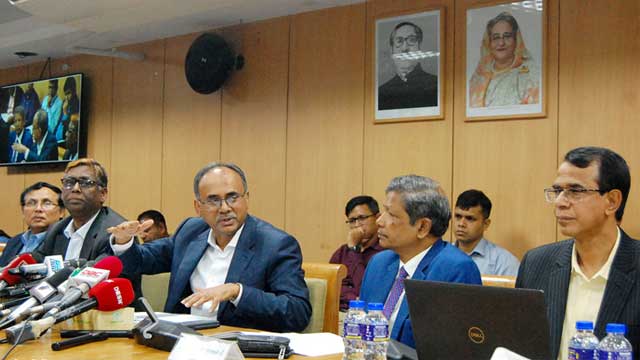Bangladesh Bank on Sunday announced a tight monetary policy statement for July-December of FY24, lifting the interest rate cap and giving priority to taming inflation and stabilising the exchange rate.
Governor Abdur Rouf Talukder announced the new monetary policy in a press conference at Jahangir Alam Conference Hall, at 3pm. Chief Economist Dr Md Habibur Rahman gave a presentation on the new MPS highlighting the different measures relevant to the macroeconomy.
The governor said, “The BB adopted a contractionary monetary policy to bring down the rate of inflation to a desired level, while remaining supportive to investment and employing generating.”
The central bank has finally removed the lending interest rate cap along with increasing the policy rate (repo rate) by 0.5 per cent from July this year from the present 6 per cent, in order to control money flow and reduce consumptions, said the BB governor.
Though it is a contractionary monetary policy, the central bank will ensure money flow for agriculture and rural credit to ensure food production and employment, Rouf said.
These measures are usually adopted to control inflation to bring macroeconomic stability and cut demand. The interest rate cap of 6 per cent on deposits and 9 per cent on lending(deposit-lending) ended, replacing it with a market-driven smart reference rate, which will be regulated by the average treasury bills rate.
As per the smart rate formula, adopted in the monetary policy, the reference rate will be calculated as the six-month moving average rate of treasury bills with a 3 per cent margin for banks and a 5 per cent margin for non-bank financial institutions.
Currently, the rate of the 6-month treasury bills stands at 7.10 per cent, so the maximum lending rate for bank loans will be 10 per cent plus, and for NBFIs 12 per cent plus.
Governor Abdur Rouf said the monetary policy focused on interest rates in order to control the growing inflation, which was created by external effects.
In reply to a query, he said a stable exchange rate and standard foreign exchange reserves are the challenges of this monetary policy.
The MPS has projected private sector credit growth of 11 per cent in FY24 from 14 per cent in FY23, and public sector credit growth to 30 per cent from 37.7 per cent.
Deputy Governors, executive directors, and different department heads were also present at the press conference.





